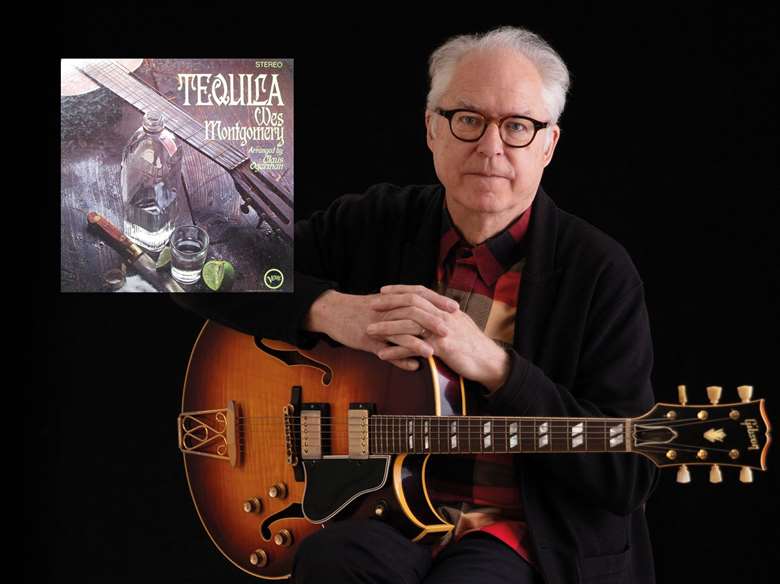Life-changing recordings: Bill Frisell on Wes Montgomery’s album Tequila
Brian Glasser
Thursday, June 13, 2024
Guitarist Bill Frisell tells Brian Glasser about how discovering Wes Montgomery’s album Tequila, and the musicians on it, opened up a whole new world of music

The big moment for me was in high school, when I was around 16. I was playing clarinet in the concert band and blues and R&B guitar with my friends. On the clarinet, everything was intellectual, reading the parts. But the guitar was another side of my brain, and playing it was all about the interaction with my friends – which is pretty much what it still is now! They were organising an all-school talent show including girls doing a dance routine to a record; and the song they put on was ‘Bumpin’ On Sunset’. I’d never heard Wes Montgomery. The band director knew I played guitar, so he brought me Tequila and said, ‘Do you think you could learn the song? It would be so much better if there were real live music.’ I was able to mimic the song enough that it was a success: at the talent show, everyone was ‘Yeah! Great!’.
It was like the crack in what I had known before, and where I was going. I became aware there was other music happening. In drug stores then, they’d have bins of cut-out albums for 59 cents. There were a lot of old jazz records – Blue Note and Riverside. So I bought the first Wes Montgomery trio record that way. Like Tequila, it was incredible; and those records made me realise that I needed to find a teacher, because up to that point I was playing by ear or along with records. So I always think of ‘Bumpin’ On Sunset’ as the beginning.
Even when musicians pass away, they still connect us – Wes Montgomery is in me, Wayne Shorter is in me, in all of us
There wasn’t much of a jazz scene in Denver; but there was the Folklore Center, where you could get some jazz albums. I would go and hang out there and just stand around and listen to what people were saying. I learned about blues there, Mississippi John Hurt and so on. And I got some guitar lessons there.
On Tequila, Ron Carter was playing bass; and on that song, he plays one note for just about the whole thing. But it’s Ron Carter, so where he places things is great. I started to see his name on so many other things – he led me very soon to Fuchsia Swing Song which I also found among these cheap records – him on a Sam Rivers record with Tony Williams and Jaki Byard. And then to all the Miles stuff. And he was on a record with Kenny Burrell. It’s incredible the way everything joins up in music. I find so much comfort in that, especially now the world seems to be shredding apart – music is passed around and connects people. Even when musicians pass away, they still connect us – Wes Montgomery is in me, Wayne Shorter is in me, in all of us.
I always think the music reflects the person. What you are comes out in the music. When I play, I feel that’s my true voice – it’s me more than when I’m trying to talk now. But music is also a world where everything makes sense.
I feel almost guilty that I have the opportunity to live that, because when I’m in the music all the horror and insanity of the world goes away.
What I love is to never know what’s going to happen. When we [my trio] play, we don’t have a setlist. When we walked onstage last night, I didn’t know what song we were going to play. I had no idea. I played a couple of notes and thought, ‘Okay, let’s go there’, which turned out to be ‘Days Of Wine And Roses’. We’ve played that plenty of times, of course; but last night we played it in a tempo we’d never played it in before. It was just a way to get started. Then there’s the audience: if they’re willing to take a chance on not knowing where it’s going, then they become part of the whole experience. You can really feel that on stage and it’s wonderful.
I feel so lucky in so many ways. All along, I’ve had people who’ve been supportive, from my parents to friends and other musicians. It makes the difference. There’s enough doubt and insecurity, and I’ve definitely had moments of despair, especially early on, but someone would always encourage me. When I was young, I thought if I practise hard, I’ll figure everything out. Then you start to realise you can’t, and it can depress you. You have to realise that you just need to love trying to get there. It’s still that way now – what you haven’t done is infinite. But that’s the truth of how amazing music is – you can’t finish it. I’m always inspired by Sonny Rollins – you hear him talk and it’s like he hardly knows how to play!
Bill Frisell’s new album Orchestras is out now on Blue Note
This article originally appeared in the July 2024 issue of Jazzwise magazine. Never miss an issue – subscribe today








